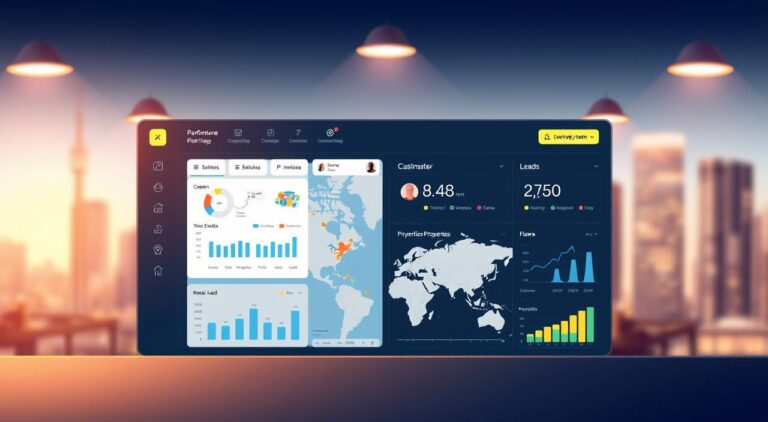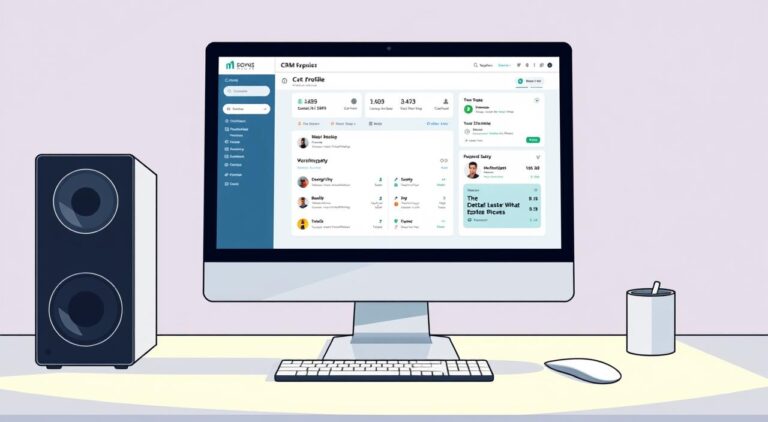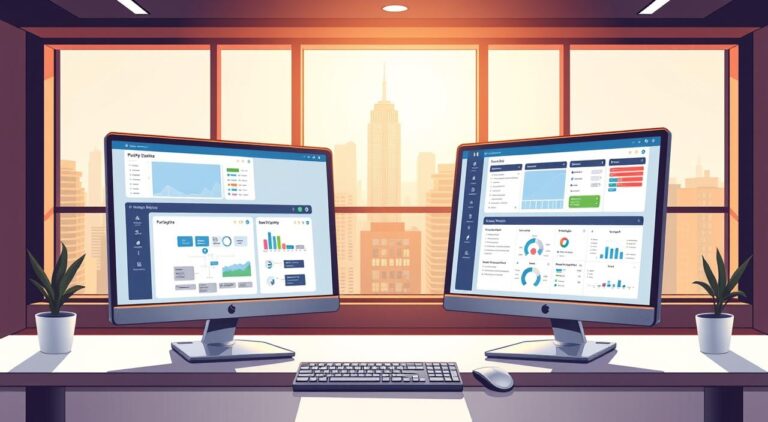Top Property Management Software for Brokers USA: Reviews & Comparisons
Modern real estate professionals need powerful tools to succeed. The right technology combines comprehensive oversight, financial control, and tenant relations into a single, efficient platform.
Choosing the correct solution is critical. Today’s brokers require systems that go far beyond basic spreadsheets. They need automation, compliance tracking, and real-time insights that directly boost profitability.
The commercial real estate industry is rapidly evolving. Cloud adoption, AI-driven analytics, and integrated workflows are now essential. Brokers using manual processes risk falling behind competitors who leverage sophisticated platforms.
This guide provides detailed comparisons of leading platforms. Our reviews are based on verified user experiences and hands-on testing. We analyze functionality, pricing, ease of use, and integration capabilities.
Investing in the right system translates to reduced operational costs and faster deal closures. It provides a significant competitive advantage in the dynamic U.S. market.
Key Takeaways
- Modern platforms unify property oversight, finances, and tenant communication.
- Automation and real-time data are crucial for profitability and staying competitive.
- The industry shift to cloud-based and AI-driven tools is essential for success.
- Selecting the right solution reduces operational costs and speeds up transactions.
- This guide offers verified comparisons to help you make an informed decision.
Overview and Key Considerations
Effective portfolio oversight in today’s market demands more than basic spreadsheet tracking. Professionals seek robust platforms to automate tasks and maintain strict compliance.
Search Intent and U.S. Market Focus
The commercial search for these solutions is specific. Leaders aim to replace outdated, manual workflows. They need systems that are both scalable and compliant with American regulations.
The U.S. real estate landscape presents unique challenges. Diverse asset types and jurisdictional rules create complexity. A sophisticated technology stack is no longer optional for staying competitive.
Guided Overview for Brokers and Property Managers
Brokerages and management firms have distinct needs from individual landlords. They coordinate teams, track commissions, and handle multiple properties. This requires centralized data and powerful automation.
The available solutions range from all-in-one platforms to specialized tools. Trusted sources, like Gartner, evaluate options based on key criteria:
Functionality, pricing transparency, and system stability are paramount for professionals who depend on minimal downtime.
Scalability is a critical factor. The right platform should grow with your business. It must accommodate more users and a larger portfolio seamlessly.
Key Features of Top property management software for brokers USA
Advanced technological solutions offer brokers a competitive edge through specialized functionalities designed for scale. These platforms integrate multiple operational aspects into a cohesive system that drives efficiency.
The right combination of capabilities transforms how professionals handle complex portfolios. It creates a foundation for sustainable growth and superior client service.
Essential Functionalities and Competitive Advantages
Core accounting features form the backbone of effective systems. They enable automated rent collection, expense monitoring, and comprehensive financial reporting.
Automation tools eliminate repetitive manual tasks. This includes lease renewals, payment reminders, and maintenance scheduling. The time savings directly reduce operational costs.
Integrated tenant communication systems centralize all interactions. Professionals maintain complete conversation histories through email, SMS, and in-app messaging. This builds stronger relationships and improves retention rates.
Advanced tracking capabilities ensure properties remain in optimal condition. Work order management and vendor assignment provide transparent accountability. It protects both managers and owners from disputes.
Lease management features include digital document storage and e-signature capabilities. Automated renewal notifications and compliance alerts ensure important deadlines are never missed.
Robust data analytics provide real-time visibility into portfolio performance. These tools enable data-driven decision-making for strategic planning.
Mobile accessibility through dedicated apps offers complete operational flexibility. Managers can handle tasks from anywhere, meeting modern business demands.
Comparative Reviews & In-Depth Product Roundup
This detailed product roundup examines cost, features, and real-world user feedback to guide your selection.
We analyze specific platforms to highlight their unique strengths for different brokerage models.
Detailed Software Reviews and Ratings
Market Leader’s automated system starts at $189 monthly. It guarantees exclusive leads and sophisticated drip campaigns.
CINC bundles lead generation and AI workflows from $899. It offers customizable dashboards for scaling teams.
Real Geeks provides a conversion-focused CRM at $299. Its behavioral tracking identifies ready-to-engage prospects.
For back-office needs, Brokermint automates transactions for $99 for five users. It handles commission splits efficiently.
QuickBooks Online, ranging from $35 to $235, is a widely adopted accounting solution. It simplifies trust-account reconciliations.
Dotloop manages end-to-end deals from $31.99. Its e-signatures and compliance checklists streamline transactions.
Performance Metrics and Cost Analysis
Beyond subscription fees, consider setup, training, and integration cost. The total ownership cost impacts ROI.
Performance metrics from user reviews highlight system stability and support responsiveness. These factors are crucial for daily operations.
For small business portfolios, Buildium and AppFolio offer robust management tools. TenantCloud is a budget-friendly alternative.
Enterprise-level platforms like CoStar Real Estate Manager provide extensive benchmarking. This software is a market leader in commercial data.
Editorial Insights from Trusted Sources
Trusted sources like The Close evaluate real estate software rigorously. Their methodology prioritizes functionality and user experience.
Pricing transparency and system stability are paramount for professionals who depend on minimal downtime.
This ensures recommendations are battle-tested. The right brokerage software directly enhances operational efficiency.
This software provides a clear path to improved profitability and client service.
User Experience, Automation & Workflow Efficiency
Operational efficiency in real estate brokerage transforms when intuitive interfaces meet automated processes. The right platform design directly impacts team productivity and adoption rates.
Intuitive User Interface and CRM Integration
Clean dashboard designs and logical navigation minimize learning curves. Teams become proficient quickly without extensive training investments.
Apto exemplifies this approach with its purpose-built real estate crm features. Native Salesforce integration enables seamless deal tracking and pipeline management.

Streamlined Processes to Enhance Operational Efficiency
Automation eliminates repetitive manual tasks that consume valuable time. Agent Crate’s hands-off social media posting pushes engaging content directly to business pages.
Coffee and Contracts provides customizable templates for marketing campaigns. Teams launch polished outreach in minutes rather than hours.
Streamlined workflows for rent collection and maintenance requests reduce operational friction. Property managers respond quickly to issues while maintaining transparent communication.
These tools create significant time savings. Professionals focus on revenue-generating activities rather than administrative tasks.
Seamless Integrations and Analytics Capabilities
Integration capabilities separate basic tools from enterprise-grade platforms that drive strategic decision-making. The ability to connect disparate systems creates a unified operational view that transforms fragmented information into actionable business intelligence.
Real-Time Data and Financial Reporting
Modern platforms deliver immediate visibility into portfolio performance through advanced analytics. Systems like Yardi Voyager integrate accounting, leasing, and operations into a single platform with automated lease administration.
Real-time data tracking enables proactive management of occupancy trends and revenue patterns. This eliminates the delays of manual reporting that often discover problems weeks too late.
Financial integration with ERP systems and accounting platforms like QuickBooks ensures accurate reporting. Automated synchronization reduces manual entry errors and improves compliance across the real estate portfolio.
Integration with Marketing and Leasing Tools
Seamless connectivity with marketing systems accelerates vacancy filling and reduces time-to-lease metrics. Platforms like MRI Software offer broad integration ecosystems that connect listing syndication, tenant screening, and virtual tour providers.
AI-driven analytics from platforms like Reonomy provide granular property-level data for informed investment decisions. This tracking capability delivers unprecedented accuracy in competitive positioning and strategic planning.
Benchmarking tools enable comparison against market standards, identifying competitive advantages in real estate property management. This integration directly impacts revenue through optimized pricing and positioning decisions.
Technological Advancements Driving Market Growth
Digital transformation is reshaping commercial real estate at an unprecedented pace. Industry professionals face mounting pressure to adopt sophisticated platforms that deliver data-driven insights. This technological evolution directly fuels market expansion and operational excellence.

Cloud Adoption and AI-Driven Analytics
Cloud-based solutions represent a fundamental shift in accessibility. They enable global team collaboration and eliminate geographic limitations. This technology reduces infrastructure costs while providing automatic updates.
AI-powered analytics revolutionize asset valuation and tenant behavior prediction. Machine learning algorithms identify patterns in historical data that humans might miss. These tools forecast market trends with remarkable accuracy.
Impact of Emerging Technology on Market Trends
Increased institutional investment demands greater transparency and sophisticated reporting. Enterprise-grade platforms meet rigorous compliance requirements while providing real-time performance tracking.
Integration with PropTech ecosystems creates comprehensive solutions. IoT sensors, smart building technology, and ESG tracking respond to growing sustainability focus. This innovation delivers competitive advantages in portfolio optimization.
Market growth projections show strong expansion driven by these technological advances. Professionals leveraging these tools manage larger portfolios efficiently while demonstrating clear ROI to stakeholders.
AdSense Optimization and High-Value Advertiser Appeal
Premium advertisers actively seek content environments that attract qualified business decision-makers. This article’s focus on professional platforms creates a natural magnet for high-value advertising campaigns.
The commercial search intent behind researching these systems indicates readers are in active buying cycles. They represent qualified prospects rather than casual browsers.
Optimizing AdX and AdSense eCPM Strategies
Comprehensive content that references established industry leaders builds strong E-E-A-T signals. Both search engines and premium advertisers value this authority.
The audience composition includes brokers, investors, and business owners. This affluent demographic commands premium advertising rates across multiple categories.
Factual, data-driven content creates the clean environment quality advertisers prefer. This directly improves AdSense eCPM performance compared to sensationalized material.
The B2B nature of these purchasing decisions involves higher transaction values. Readers become exceptionally valuable to advertisers offering complementary professional services.
Focusing on operational efficiency and investment returns aligns with advertiser priorities. Their products address similar business objectives for the same professional audience.
Maintaining content quality keeps readers engaged for longer sessions. This improves ad viewability and performance, maximizing revenue potential.
Conclusion
Successful real estate professionals understand that technology adoption is no longer optional but essential for competitive advantage. The right platform transforms how your brokerage manages properties, serves clients, and grows revenue.
This comprehensive review highlights solutions spanning marketing automation, CRM platforms, transaction systems, and financial tools. Each category addresses specific operational challenges faced by today’s property managers.
Small business operations benefit from affordable platforms with core functionality. Larger commercial property portfolios require enterprise-grade systems with advanced analytics and multi-user capabilities.
The tangible benefits include streamlined lease management, enhanced compliance, and significant time savings. These advantages allow professionals to focus on revenue-generating activities.
Share your experiences or questions about specific platforms in the comments below. Stay informed about emerging innovations that will define competitive advantage in our evolving industry.






